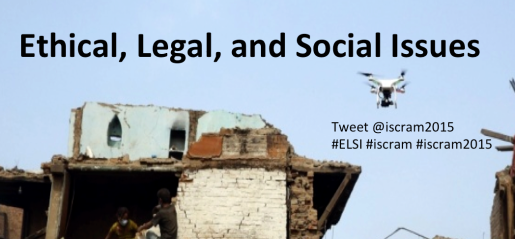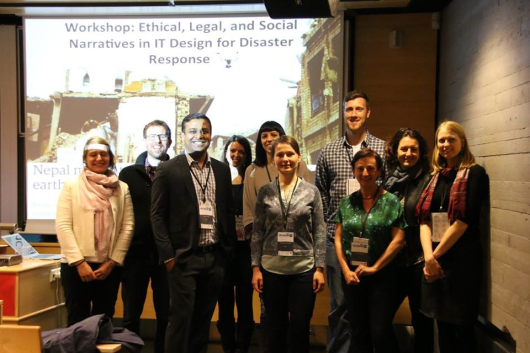The programme for the ELSI Track at ISCRAM 2016 is now online! See here for more …

A workshop on ELSI in Public Protection and Disaster Relief at the 2016 Public Safety Communications (PSCE) Conference in Brussels, organised by Monika Buscher, Catherine Easton, Katrina Petersen and Lina Jasmontaite in a cooperation between the SecInCoRe and EPISECC projects . The programme includes talks on:
Novelties of the General Data Protection Regulation – Irina Vasiliu, DG JUST, European Commission Ms Irina Vasiliu works at the European Commission’s Directorate-General for Justice and Consumers (DG JUST)
Towards a new digital ethics, the EDPS and the Ethics Advisory Group Delphine Harou, European Data Protection Supervisor (EDPS)
Legal certainty and public safety by design Mireille Hildebrandt, Professor Vrije Universiteit, Brussels, Belgium
Providing Information Privacy with Attack Modelling Blaž Ivanc, Jožef Stefan Institute, Slovenia
Multi-stakeholder collaboration for European Commission’s standardisation request on data protection by design in security technologies Matthias Pocs, ANEC, Germany
Short Work in Progress Presentations
ECOSSIAN Project, Jessica Schroers, legal researcher at KU Leuven, CiTiP
eVACUATE Project, Hanneke Vreugdenhil, HVK Consultants
Ethics in Biometrics Ioannis Daniilidis, KEMEA, Greece
Incorporating ethical, legal and social considerations in the iTRACK project: Considerations going forward Julia Muraszkiewicz, Trilateral Research Ltd, UK
Draft Whitepaper: ELSI Guidelines for IT in Risk Governance Monika Büscher, Katrina Petersen (Editors), Centre for Mobilities Research, SecInCoRe
Not too long ago, this was the stuff of science fiction, but flying robotic devices equipped with facial recognition technology and mobile phone interception kit are increasingly commonplace.
law enforcement uses which may be, for instance, search and rescue, disaster response, border control/protection, civil protection, aerial surveillance, traffic monitoring, observation and pursuit of criminal suspects, or observation of civil unrest
Conflating law enforcement and disaster response like this seems problematic. That’s why I’m interested. We do discuss some aspects of the regulatory and policy innovation pursued in tis area in this article ‘Don’t Drone? Negotiating Ethics of RPAS in Emergency Response‘. But this is very much work in progress … Any comments/leads would be very welcome!
https://epic.org/privacy/facerecognition/ EPIC’s always useful!
Great article on EU Data Protection reform June 2015
https://theconversation.com/how-eu-data-protection-law-could-interfere-with-targeted-ads-43651
In an article on ‘This is what happens when you bring a robot to an Ebola ward‘ Nidhi Subbaraman (@NidhiSubs) describes how nurses resisted experimental implementation of a robot that could facilitate communication between health workers inside and outside containment zones. They said that
a robot would give doctors yet another excuse to avoid meeting patients
Drives home how innovation has to be more ‘holistic’ for lack of a better word, co-realising complete socio-technical futures that respond to challenges, rather than technical ‘solutions’ and how this needs to be done with all of those who would be working with the technology, not just the elites.


We had great, wide-ranging, in-depth discussions at the ELSI Narratives Workshop and the ELSI Track at http://iscram2015.uia.no. All ELSI Track papers are online:
Find an editorial that summarises contributions to the workshop here:
Katrina Petersen, Monika Büscher
Ethical, legal and social issues (ELSI) are widely recognised as important in IT innovation for crisis response and management. However, attention often struggles to get beyond theorising basic concepts, when the realities of how difficulties and opportunities manifest are complex and practical. Unless these realities are understood, solutions to ELSI will remain at the surface, missing opportunities to responsibly and creatively leverage the potential of IT in disaster response. This workshop brings together narratives of lived experiences of ethical, legal, and social issues encountered in the context of IT innovation in disaster response, and analyses of normative, policy and regulatory backgrounds. In this editorial, we motivate this turn to narrative, summarise the contributions that will be presented on the day, and set out some key questions.
Successful Final Conference for COSMIC
The COSMIC Final Conference was held on 26th February 2015 in Brussels, Belgium. The conference centred around three key themes: (1) crisis & social media with concrete use cases; (2) ethical, legal, and social considerations; (3) guidelines and good practices for new media. Throughout the one-day event, captivating presentations were delivered and informative question and answer panel sessions were held, as well as a lunch break that provided good networking opportunities.
The keynote speech of the Conference was delivered by Stuart Allan, Professor at Cardiff University, who spoke about the images of crisis that are portrayed in the news in comparison to those shown by citizen witnesses. During the day, more practical examples of the use of social media were demonstrated by two case studies – one on the use of social media during a large-scale (hail)storm in Antwerp and the other on the practicalities of the social media strategy of the Greater Manchester Police.
Throughout the Conference, a key notion was common in all the presentations – citizens want to and should be involved in crisis management via social media. The accounts of citizens are oftentimes more raw and real than those presented by news agencies, and can therefore give first responders a more realistic insight into the situation.
Part of the Conference was also dedicated to the introduction of the COSMIC Guidelines for the use of new media in crisis situations. The Guidelines aim to enhance the safety and security of citizens by supporting both citizens and public authorities in their use of social media to complement their crisis management efforts. The COSMIC Guidelines are split in two sets of tips and tricks for public authorities and for the public.
A consultation on the COSMIC Guidelines (available here) is currently open and will last until 13th March 2015.
More than 70 people attended the COSMIC Final Conference, including representatives from the industry, government, civil society organisations, as well as the academia. Thanks to the interesting presentations and active participation from the attendees, the COSMIC Final Conference turned out to be a great success for the project.
Presentations from the conference are available here: http://www.cosmic-project.eu/Working_Documents
About COSMIC
COSMIC will deliver a set of instructions, recommendations and best practices related to the exploitation of social media in emergency situations. This will be done by addressing and analysing the roles of major stakeholders associated with crisis management and by reviewing their communication needs, infrastructure bottlenecks and security priorities during disasters.
For further information please contact:
Public Safety Communication Europe (PSCE)
Marie-Christine BONNAMOUR
Rue des Deux Eglises 39
B-1000 Brussels, Belgium
COSMIC website: www.cosmic-project.eu
It’s that time of year again! The ELSI track team are pleased to announce that the ELSI track will once again be appearing at next years annual ISCRAM conference.
The 12th International Conference on Information Systems for Crisis Response and Management is due to take place between the 24-27 May in Kristiansand, Norway.
If you are interested in submitting a paper or poster to the ELSI track, please check out our call for papers, which can be found by visiting the following page on the ISCRAM 2015 website.
If you have any questions please get in touch with us!
As we progress with the development of the ELSI Working Group at ISCRAM (more soon!) we have set up a shiny Twitter account for all things ELSI – follow us on @IscramElsi for updates.
Check out our dedicated page for ELSI @ ISCRAM 2014 here.
Join us in discussing ELSI during the conference using our dedicated hashtag: #ELSI_ISCRAM2014
We look forward to the ELSI sessions on Monday!